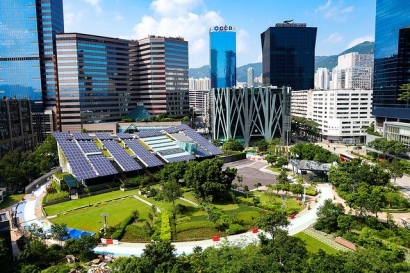
The oil and natural gas industry produces high quantities of greenhouse gas emissions. These air pollutants are the leading cause of climate change. Professionals and the public may improve the global ecosystem and economy by adopting solar and wind energy.
The future of the oil and natural gas industry is uncertain because of its government ties. Location-based energy sources allow one professional to dictate pricing and accessibility. The ownership of depletable resources creates power challenges because roughly 80% of the global energy supply comes from fossil fuels.
Countries must adopt independent energy sources to minimize inconsistent pricing and accessibility. The European Union (E.U.) plans to adopt renewable power sources and meet its net-zero goals. Creating independent clean energy supplies reduces gas prices and emissions.
The E.U. has a longstanding relationship with the Russian gas industry. It receives nearly 35% of its energy supply from Russia. Solar and wind power offer a sustainable solution to the E.U.’s economic and environmental challenges.
The International Energy Agency (IEA) created a plan that shifts the E.U.’s power supply away from Russia while supporting the European Green Deal. Energy professionals in Europe can use Russia’s attack on Ukraine as an opportunity to advance net-zero goals. A key component of the IEA plan is accelerating solar and wind power production projects.
Europe’s Green Deal helps countries achieve net-zero emissions by 2050 and develop a sustainable economy. Advancing renewable energy production increases nations’ access to emissions-free electricity sources. It also reduces energy costs, which improves economic stability.
Economic stability is essential for many regions as society transitions out of a pandemic-induced recession. Individuals are ready to access secure jobs and companies are reopening their businesses. Nations can adopt renewable energy production by investing in advanced technologies and expanding the sustainable job market.
Countries can transition towards renewables by creating green jobs to build and maintain on- and off-shore wind farms. When turbines produce electricity, their moving parts create heat. Friction and high heat outputs can cause environmental and economic challenges.
Training highly skilled professionals to maintain turbines can optimize clean energy production and wind power’s cost-efficiency. Nations may also invest in solar technological advancements to increase their clean energy supplies. The topography and structural development of some countries are incompatible with solar farms.
Energy professionals can use floating photovoltaic (“floatovoltaic”) panels to produce emission-free electricity on lakes, canals, and the ocean. Investing in solar energy production is essential to a nation’s economy. Solar is the most cost-effective power source to date.
Countries can access the most affordable and accessible renewable energy supplies by building a clean electric grid. Energy professionals are integrating hydrogen storage systems to make the most of solar and wind power. The systems use electrolyzers to convert electricity into hydrogen and water.
Storage devices hold renewable energy as a solid using hydrogen. When a country’s demand for electricity increases, the technology sends hydrogen through a fuel cell converter and creates accessible energy. Countries may minimize their reliance on oil and natural gas by adopting supportive technologies.
Previously, environmentalists predicted a global transition to clean energy by 2050. With Russia’s invasion increasing gas prices, countries may replace fossil fuels with renewables now. The shift away from oil and natural gas will continue until the energy sector reaches net-zero emissions.
Eco-conscious consumers are also creating an urgency for sustainable practices. The urgency influences corporations to adopt clean energy sources and minimize their reliance on emissions-producing power supplies. Government regulations, rising gas prices, and sustainable customers influence the immediate shift towards renewables.

